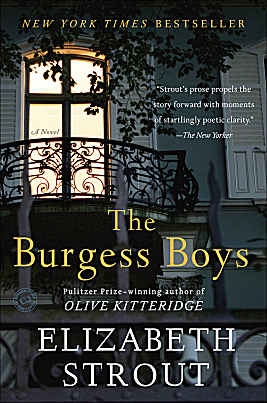Pulitzer prize-winning author Elizabeth Strout had long wanted to write about the Burgess family, a dysfunctional clan of two brothers and their sister, a single mom with a teenage son who does something terrible.
Strout said the characters came to her years ago, but the story unfolded slowly. "The Burgess Boys" emerged when she found a way to connect the characters to the growing Somali community in her home state of Maine, and the cultural and other conflicts that demographic change can set in motion.
"You have got three siblings that have lived very different lives," she said. "And then of course there is the very real racial aspect of a dark skinned population moving into a state that has been traditionally the whitest state of all 50, and so in my mind that's pretty big!"
On Saturday, Strout will meet in Minneapolis with members of the Somali community to talk about her latest book, which centers on a hate crime at a Somali mosque.
Strout said the story is based on something that happened in Maine in 2002.
"There was a real-life event of a man in Lewiston, Maine who threw a pig's head through a mosque and it just seemed to completely coincide with what I needed to be doing with these Burgess boys," she said. "So somehow the alchemy was right."

Like Minnesota, Maine has gained a significant Somali population in recent years. Strout wanted to explore the inevitable conflicts inherent in a changing community. It presented her a huge challenge: telling parts of the story from the viewpoint of Somali characters.
"Because if I didn't," she said, "It seemed to me that the Somali community would remain 'the other' in the book and that I would not have told the story I wanted to tell, which is that everybody's there and everybody is living in this community."
Strout began reading everything she could about Somalia and Somali migration to the United States. She made contacts in the community and spent seven years talking, learning and writing.
"Every so often, well quite often, I thought, 'Now I have done it. I have bitten off more than I can chew.' But there was no going back because I loved these people," she said with a laugh. "I thought, 'you are just going to have to see this one through.'"
Strout's book came out last year. Several chapters are written exclusively in the voice of an elderly Somali cafe owner.
"It was the laugh. The policemen's casual laugh when they spotted the pig's head on the rug. Abdikarim could not stop hearing it, seeing it.
He would wake in the night picturing the two uniformed men, the short one especially with his small eyes and unintelligent face, the sound of mirth he made before he straightened up and asked sternly, looking around, "Who speaks English? Somebody better speak English."
As though they had done something wrong. This thought went repeatedly through Abdikarims head: But we have done nothing wrong."
The book became a bestseller, but Strout was surprised that most readers saw it simply as a domestic drama, ignoring the social, racial and class aspects of the story.
That's where Strout's husband stepped in. He began sending emails to people he thought might have an interest in those other aspects of the story. One message ended up in the inbox of Ahmed Yusuf in Minneapolis.
Yusuf, the author of the book "Somalis in Minnesota," was intrigued. He bought "The Burgess Boys" and found himself mesmerized.
"I didn't expect a fiction writer, by the way, to know this much about Somalia or Somalis," he said. "You could sense how much the person knows about the subject matter in seconds."
Too often, Yusuf said, depictions of Somalis in the United States are cliche-ridden and shallow. In "The Burgess Boys," he found relief.
"It was, I think, liberating," he said "It was cathartic to some extent. It was a feeling that I cannot even describe."
Yusuf became an advocate for the book. He wrote a review which attracted attention from Somalis all over the world. He handed out copies to anyone who was interested. When Elizabeth Strout's book tour for the paperback brought her to Minneapolis, he asked her to do a special reading.
"Any time that you feel someone has the guts, just exactly to put himself out there for you, and you feel that, you want to say thank you," he said.
Strout describes the Somali invitation as wonderful and generous. She said she is looking forward to learning from the community in large part because she knows that her next challenge is to work out how she further uses the knowledge she has amassed in writing "The Burgess Boys."
"If I did miss the boat in certain ways, I'll be really quite open to hearing about it," she said. "I don't feel trepidatious about this at all. I feel quite the opposite."
Strout's reading will be at 4 p.m. Saturday at the African Development Center in the Cedar Riverside neighborhood. Yusuf hopes to see people from outside the Somali community too.
The author also will read at Common Good Books in St Paul at 4 p.m. Sunday.
No comments:
Post a Comment